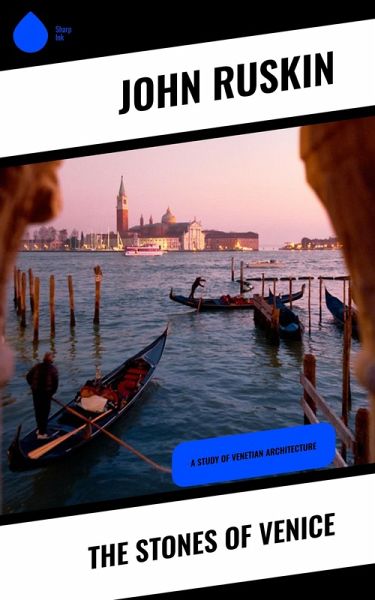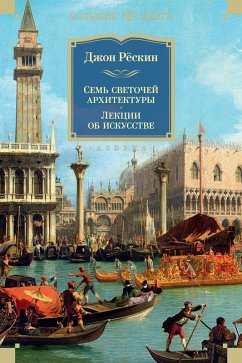
The Stones of Venice (eBook, ePUB)
A Study of Venetian Architecture

PAYBACK Punkte
0 °P sammeln!
In "The Stones of Venice," John Ruskin intricately examines the architecture, art, and societal values of Venice, employing a rich and evocative literary style that fuses detailed descriptions with philosophical musings. Published in three volumes between 1851 and 1853, this seminal work not only dissects the Gothic architectural elements of the city but also explores the broader implications of craftsmanship and moral values within the constructs of society. Ruskin's passionate prose reflects the Romantic sentiment of the era, highlighting a growing inclination towards appreciating beauty and...
In "The Stones of Venice," John Ruskin intricately examines the architecture, art, and societal values of Venice, employing a rich and evocative literary style that fuses detailed descriptions with philosophical musings. Published in three volumes between 1851 and 1853, this seminal work not only dissects the Gothic architectural elements of the city but also explores the broader implications of craftsmanship and moral values within the constructs of society. Ruskin's passionate prose reflects the Romantic sentiment of the era, highlighting a growing inclination towards appreciating beauty and opposing industrialization's detrimental effects on artistry. John Ruskin (1819-1900), an influential art critic and social thinker, was profoundly shaped by his upbringing and education, which immersed him in the study of nature, art, and the writings of the Romantic poets. His experiences travelling through Europe, particularly in Venice, cultivated his appreciation for Gothic architecture, which he viewed as a symbol of moral integrity and craftsmanship, in stark contrast to the mechanization and mass production of his time. Ruskin's cultural critiques extended beyond architecture, advocating for the dignity of labor and the importance of social responsibility. "The Stones of Venice" is a must-read for anyone interested in architectural history, art criticism, and social philosophy. Its lyrical examinations of beauty stand as a timeless reminder of the intrinsic relationship between art, society, and ethics. Readers will find themselves captivated by Ruskin's eloquent reflections that summon a deeper appreciation of not only Venice but also the role of art in illuminating the human experience.
Dieser Download kann aus rechtlichen Gründen nur mit Rechnungsadresse in A, B, BG, CY, CZ, D, DK, EW, E, FIN, F, GR, HR, H, IRL, I, LT, L, LR, M, NL, PL, P, R, S, SLO, SK ausgeliefert werden.








![Stones of Venice [introductions] (eBook, ePUB) Cover Stones of Venice [introductions] (eBook, ePUB)](https://bilder.buecher.de/produkte/58/58499/58499730n.jpg)




